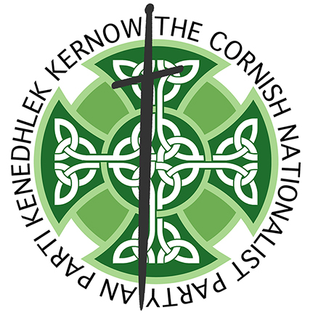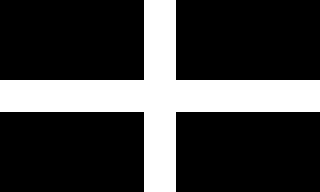The Cornish Constitutional Convention (CCC; Cornish : Senedh Kernow) was formed in November 2000 with the objective of establishing a devolved Cornish Assembly (Senedh Kernow). The convention is a cross-party, cross-sector association with support both in Cornwall and elsewhere.[ citation needed ] It is not campaigning for any form of separatism or independence. [1]
The convention had been meeting for some time prior to November 2000 as an informal discussion group. In less than two years, it had attracted the signatures of "about 50,000" people on a petition calling for a referendum on a Cornish Assembly, which is a little over 10% of the total Cornish electorate. A delegation led by the St Ives Liberal Democrat Member of Parliament (MP) Andrew George and representatives of the convention, (Richard Ford, Dick Cole, David Fieldsend and Andrew Climo) presented the declaration to 10 Downing Street on Wednesday 12 December 2001. [2]
According to the 2001 petition, "We, the People of Cornwall, must have a greater say in how we are governed. We need a Cornish Assembly that can set the right democratic priorities for Cornwall and provide a stronger voice for our communities in Britain, in Europe and throughout the wider world." [3] In this, the Cornish Constitutional Convention sits within the milieu of increased desire for greater autonomy by European regions. Given Cornwall's geographical peripherality, economic status, cultural and linguistic circumstances it is unsurprising that Cornwall has a devolutionary movement.[ citation needed ]
Unlike the Scottish Constitutional Convention, which had the support of much of the political establishment of Scotland including formal membership of political parties, churches and civic groups, the CCC is more akin to the Scottish Convention's predecessor, the Campaign for a Scottish Assembly.
Formed in November 2000, the convention states that its key objectives are to:
Among its publications are Devolution for One and All: Governance for Cornwall in the 21st Century, [4] The Case for Cornwall: Cornwall's response to the Government's Devolution White Paper, [5] Devolution for One and All: Cornwall Devolution for Prosperity, and Devolution's Future: A New Proposal for Regional Devolution.

The Cornish Nationalist Party is a political party, founded by Dr James Whetter, who campaigned for independence for Cornwall.

Mebyon Kernow – The Party for Cornwall is a Cornish nationalist, centre-left political party in Cornwall, in southwestern Britain. It currently has five elected councillors on Cornwall Council, and several town and parish councillors across Cornwall.

The Scottish Constitutional Convention (SCC) was an association of Scottish political parties, churches and other civic groups, that developed a framework for Scottish devolution. It is credited as having paved the way for the establishment of the Scottish Parliament in 1999.

Politics of England forms the major part of the wider politics of the United Kingdom, with England being more populous than all the other countries of the United Kingdom put together. As England is also by far the largest in terms of area and GDP, its relationship to the UK is somewhat different from that of Scotland, Wales or Northern Ireland. The English capital London is also the capital of the UK, and English is the dominant language of the UK. Dicey and Morris (p26) list the separate states in the British Islands. "England, Scotland, Northern Ireland, the Isle of Man, Jersey, Guernsey, Alderney, and Sark.... is a separate country in the sense of the conflict of laws, though not one of them is a State known to public international law." But this may be varied by statute.
The Celtic League is a pan-Celtic organization, founded in 1961, that aims to promote modern Celtic identity and culture in Ireland, Scotland, Wales, Brittany, Cornwall and the Isle of Man – referred to as the Celtic nations; it places particular emphasis on promoting the Celtic languages of those nations. It also advocates further self-governance in the Celtic nations and ultimately for each nation to be an independent state in its own right. The Celtic League is an accredited NGO with roster consultative status to the United Nations Economic and Social Council (EcoSoc).

The constitutional status of Cornwall has been a matter of debate and dispute. Cornwall is an administrative county of England.

Cornwall Council, known between 1889 and 2009 as Cornwall County Council, is the local authority which governs the non-metropolitan county of Cornwall in South West England. Since 2009 it has been a unitary authority, having taken over district-level functions when the county's districts were abolished. The non-metropolitan county of Cornwall is slightly smaller than the ceremonial county, which additionally includes the Isles of Scilly. The council has had a Conservative Party majority since the 2021 local elections. Its headquarters is Lys Kernow in Truro.
A Cornish Assembly is a proposed devolved law-making assembly for Cornwall along the lines of the Scottish Parliament, the Senedd and the Northern Ireland Assembly in the United Kingdom.

The South West Regional Assembly (SWRA) was the regional chamber for South West England, established in 1999. It was wound up in December 2008. Its functions were taken on by the Strategic Leaders' Board, the executive arm of the newly established South West Councils.

Cornwall is administered as a county of South West England whose politics are influenced by a number of issues that make it distinct from the general political scene in the wider United Kingdom, and the political trends of neighbouring counties. Its position on the geographical periphery of the island of Great Britain is also a factor.
The Royal Commission on the Constitution, also referred to as the Kilbrandon Commission or Kilbrandon Report, was a long-running royal commission set up by Harold Wilson's Labour government to examine the structures of the constitution of the United Kingdom and the British Islands and the government of its constituent countries, and to consider whether any changes should be made to those structures. It was started under Lord Crowther on 15 April 1969, Lord Kilbrandon took over in 1972, and it finally reported on 31 October 1973.

Cornish nationalism is a cultural, political and social movement that seeks the recognition of Cornwall – the south-westernmost part of the island of Great Britain – as a nation distinct from England. It is usually based on three general arguments:

Devonwall was a political concept introduced in the United Kingdom in the 1970s by the Conservative government. It was an attempt to link Cornwall and Devon together in an economic, political and statistical sense to form a South West region. This involved combining and centralising some local government functions and services such as the police, ambulance, fire services and media output such as local TV and newspapers.

Richard Garfield Jenkin, was a Cornish nationalist politician and one of the founding members of Mebyon Kernow. He was also a Grand Bard of the Gorseth Kernow.

Cornish devolution is the movement to increase the governing powers of the County of Cornwall.
Andrew Climo is a Cornwall-based, Cornish author and community activist. He is chief executive and founder of Community Leaders CIC, a community development agency, a Director of the Community Sector Coalition, a network for community groups in the British Isles, and an activist for Cornish devolution and the Cornish language.

Separatism in the United Kingdom may refer to the secession of any of the countries of the United Kingdom from the union. Less significant movements for separatism within England also exist.

In the United Kingdom, devolution is the Parliament of the United Kingdom's statutory granting of a greater level of self-government to the Scottish Parliament, the Senedd, the Northern Ireland Assembly and the London Assembly and to their associated executive bodies: the Scottish Government, the Welsh Government, the Northern Ireland Executive and in England, the Greater London Authority and combined authorities.

Federalism in the United Kingdom aims at constitutional reform to achieve a federal UK or a British federation, where there is a division of legislative powers between two or more levels of government, so that sovereignty is decentralised between a federal government and autonomous governments in a federal system.

Welsh devolution is the transfer of legislative power for self-governance to Wales by the Government of the United Kingdom.